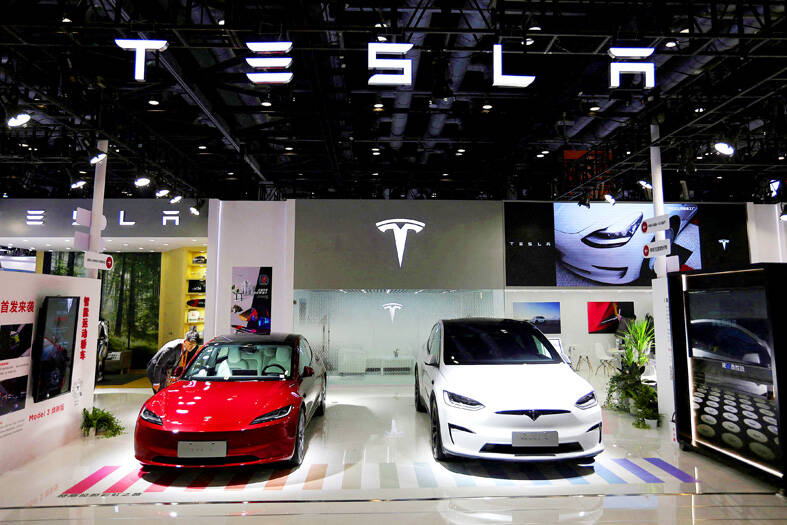Tesla Inc’s global sales fell for the second straight quarter despite price cuts and low-interest financing offers, another sign of weaking demand for the company’s products and electric vehicles overall.
The Austin, Texas, company said yesterday that it sold 436,956 vehicles from April through June, down 4.8 percent from 466,140 sold the same period a year ago. But the sales were better than the 436,000 that analysts had expected.
Demand for electric vehicles (EVs) worldwide is slowing, but they’re still growing for most automakers. Tesla, with an aging model lineup and relatively high average selling prices, has struggled more than other manufacturers but is likely to remain the EV leader in the US and across the world.

Photo: Florence Lo, Reuters
Tesla gave no explanation for the sales decline, which is a harbinger of what to expect when the company posts second-quarter earnings on July 23.
Nearly all of Tesla’s sales came from the smaller and less-expensive Models 3 and Y, with the company selling only 21,551 of its more expensive models that include X and S, as well as the new Cybertruck.
The sales decline came despite Tesla knocking US$2,000 off the prices of three of its five models in the US in April. The company cut the prices of the Model Y, Tesla’s most popular model and the top-selling EV in the US, and also of the Models X and S.
Last week, Tesla lopped US$2,340 off the base price of some newly revamped Model 3s that were in the inventory shipped to its stores.
In addition, Tesla in May offered 0.99 percent financing for up to six years on the Model Y. Last month, it offered interest as low as 1.99 percent for three years on the rear-wheel-drive Model 3. Typical new-vehicle interest rates average just over 7 percent, according to Edmunds.com.
Also during the quarter, Tesla knocked roughly a third off the price of its “Full Self Driving” system — which can’t drive itself and so drivers must remain alert and be ready to intervene — to US$8,000 from US$12,000.
Jessica Caldwell, head of insights for Edmunds.com, said Tesla is having trouble in a market where most early adopters already have EVs, and mainstream buyers are more skeptical that electric cars can meet their needs.
“They’re more pragmatic. They want to know where am I charging? What will this cost me?” she said.
Tesla also has a set of unique problems, mainly a model lineup that doesn’t look much different than it did years ago. With Tesla’s price cuts, used vehicle prices tumbled. Anyone wanting a Tesla can get a far better deal buying a used one, Caldwell said. “If you’re looking at monthly payments, it’s hard to compete against,” she said.
Caldwell doesn’t see any big catalyst this year that would boost Tesla sales unless gasoline prices spike. The new Cybertruck is being sold only in small numbers, and the rest of the lineup is old.
“Most people would be hard pressed to figure out which one is the newer one and which one is the older one,” she said.

BIG BUCKS: Chairman Wei is expected to receive NT$34.12 million on a proposed NT$5 cash dividend plan, while the National Development Fund would get NT$8.27 billion Taiwan Semiconductor Manufacturing Co (TSMC, 台積電), the world’s largest contract chipmaker, yesterday announced that its board of directors approved US$15.25 billion in capital appropriations for long-term expansion to meet growing demand. The funds are to be used for installing advanced technology and packaging capacity, expanding mature and specialty technology, and constructing fabs with facility systems, TSMC said in a statement. The board also approved a proposal to distribute a NT$5 cash dividend per share, based on first-quarter earnings per share of NT$13.94, it said. That surpasses the NT$4.50 dividend for the fourth quarter of last year. TSMC has said that while it is eager

‘IMMENSE SWAY’: The top 50 companies, based on market cap, shape everything from technology to consumer trends, advisory firm Visual Capitalist said Taiwan Semiconductor Manufacturing Co (TSMC, 台積電) was ranked the 10th-most valuable company globally this year, market information advisory firm Visual Capitalist said. TSMC sat on a market cap of about US$915 billion as of Monday last week, making it the 10th-most valuable company in the world and No. 1 in Asia, the publisher said in its “50 Most Valuable Companies in the World” list. Visual Capitalist described TSMC as the world’s largest dedicated semiconductor foundry operator that rolls out chips for major tech names such as US consumer electronics brand Apple Inc, and artificial intelligence (AI) chip designers Nvidia Corp and Advanced

Saudi Arabian Oil Co (Aramco), the Saudi state-owned oil giant, yesterday posted first-quarter profits of US$26 billion, down 4.6 percent from the prior year as falling global oil prices undermine the kingdom’s multitrillion-dollar development plans. Aramco had revenues of US$108.1 billion over the quarter, the company reported in a filing on Riyadh’s Tadawul stock exchange. The company saw US$107.2 billion in revenues and profits of US$27.2 billion for the same period last year. Saudi Arabia has promised to invest US$600 billion in the US over the course of US President Donald Trump’s second term. Trump, who is set to touch

SKEPTICAL: An economist said it is possible US and Chinese officials would walk away from the meeting saying talks were productive, without reducing tariffs at all US President Donald Trump hailed a “total reset” in US-China trade relations, ahead of a second day of talks yesterday between top officials from Washington and Beijing aimed at de-escalating trade tensions sparked by his aggressive tariff rollout. In a Truth Social post early yesterday, Trump praised the “very good” discussions and deemed them “a total reset negotiated in a friendly, but constructive, manner.” The second day of closed-door meetings between US Secretary of the Treasury Scott Bessent, US Trade Representative Jamieson Greer and Chinese Vice Premier He Lifeng (何立峰) were due to restart yesterday morning, said a person familiar